Typhoon Yagi, the strongest tropical storm to impact Asia so far in 2024, has triggered landslides and flash floods that have killed at least 226 people, as reported by Reuters. More than 100 additional people remain missing, while roughly 800 were injured.
Casualties surged this week after a flash food caused by the typhoon on Tuesday wiped out the entire hamlet of Lang Nu in northern Vietnam’s Lao Cai province. Meanwhile several districts in Hanoi were evacuated due to intense flooding, with the city's iconic Red River swelling to a 20-year high. Hoang Van Ty, a Vietnamese citizen whose house was flooded in Thai Nguyen province, which is north of Hanoi, told Reuters that he "never thought my house would be under water this deep."
Prior to reaching Vietnam on Saturday, Typhoon Yagi made landfall in the Chinese island of Hainan — a popular tourist destination — as well as various locations throughout the Philippines, where at least 20 people are believed to have been killed. In China, four deaths were reported with dozens of people missing in both countries.
Local Red Cross offices and activist groups like Greenpeace International point out that, although tropical storms traditionally hit South Asia during this time of year, the ferocity of the current storms is unprecedented. Speaking to the Associated Press, director of the Earth Observatory of Singapore Benjamin Horton said that storms like Typhoon Yagi are “getting stronger due to climate change, primarily because warmer ocean waters provide more energy to fuel the storms, leading to increased wind speeds and heavier rainfall.”
Indeed, Earth has endured its hottest summer ever recorded, for the second year in a row. Recent research forecasts a future of freakier weather thanks to burning fossil fuels, as out-of-control heat makes our climate more "weird" and deadly.



Shares